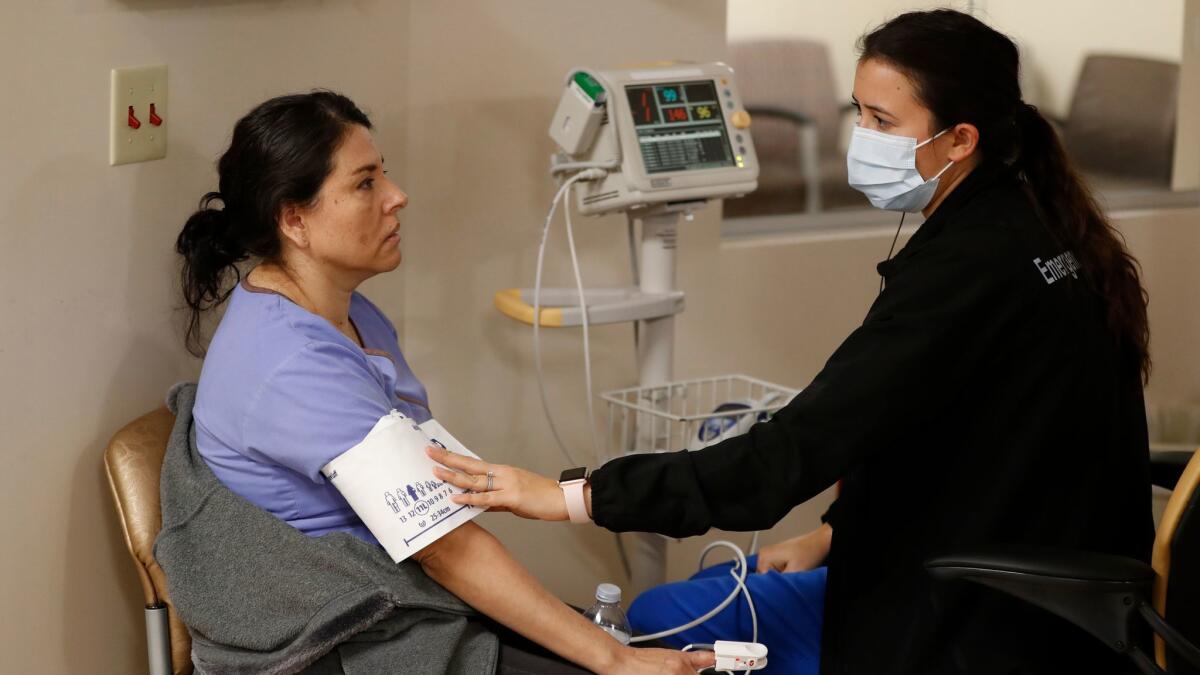In this deadly flu season, here are tips on how to protect yourself

- Share via
California is in the midst of a dangerous flu season.
Health officials said Friday that 27 people younger than 65 have died of the flu in California since October, compared with three during the same time period last year. Nationwide, flu activity spiked sharply in late December and continues to grow.
Here is some key information, including tips to stay healthy, from national, state and local health agencies:
Get vaccinated
Officials say this is the single best way to avoid the flu.
Avoid close contact
Avoid close contact with people who are sick. When you are sick, keep your distance from others to protect them from getting sick too.
Stay home when you are sick
If possible, stay home from work, school and running errands when you are sick. This will help prevent spreading your illness to others.
Cover your mouth and nose
Cover your mouth and nose with a tissue when coughing or sneezing. It may prevent those around you from getting sick.
Clean your hands
Washing your hands often will help protect you from germs. If soap and water are not available, use an alcohol-based hand sanitizer.
Avoid touching your eyes, nose or mouth
Germs often are spread when a person touches something that is contaminated with germs and then touches his or her eyes, nose or mouth.
Practice other good health habits
Clean and disinfect frequently touched surfaces at home, work or school, especially when someone is ill. Get plenty of sleep, be physically active, manage your stress, drink plenty of fluids and eat nutritious food.
How do flu vaccines work?
Flu vaccines cause antibodies to develop in the body about two weeks after vaccination. These antibodies provide protection against infection with the viruses that are in the vaccine.
The seasonal flu vaccine protects against the influenza viruses that research indicates will be most common during the upcoming season. Traditional flu vaccines (called “trivalent” vaccines) are made to protect against three flu viruses: two influenza A viruses (H1N1 and H3N2) and an influenza B virus. There also are vaccines made to protect against four flu viruses (called “quadrivalent” vaccines). These vaccines protect against the same viruses as the trivalent vaccine and an additional B virus.
Does flu vaccine work right away?
No. It takes about two weeks after vaccination for antibodies to develop in the body and provide protection against influenza virus infection. That’s why it’s better to get vaccinated early in the fall, before the flu season really gets underway.
Can I get seasonal flu even though I got a flu vaccine this year?
Yes. There is still a possibility you could get the flu even if you were vaccinated. The ability of flu vaccine to protect a person depends on various factors, including the age and health of the person being vaccinated, and the similarity or “match” between the viruses used to make the vaccine and those circulating in the community. If the viruses in the vaccine and the influenza viruses circulating in the community are closely matched, vaccine effectiveness is higher. If not, vaccine effectiveness can be reduced.
There are more than a dozen public health clinics in Los Angeles County offering flu vaccines.
What are signs and symptoms of the flu?
People who have the flu often feel some or all of these signs and symptoms, which usually start suddenly, not gradually:
- Fever or feeling feverish with chills
- Cough
- Sore throat
- Runny or stuffy nose
- Muscle or body aches
- Headaches
- Fatigue (very tired)
- Some people may have vomiting and diarrhea, though this is more common in young children than in adults
How does the flu spread?
Most experts believe that flu viruses spread mainly by tiny droplets made when people with flu cough, sneeze or talk. These droplets can land in the mouths or noses of people who are nearby. Less often, a person also might get flu by touching a surface or object that has flu virus on it and then touching his or her own mouth, nose or eyes.
Source: L.A. County Public Health; Centers for Disease Control and Prevention; California Public Health; Orange County Public Health
More to Read
Sign up for Essential California
The most important California stories and recommendations in your inbox every morning.
You may occasionally receive promotional content from the Los Angeles Times.









